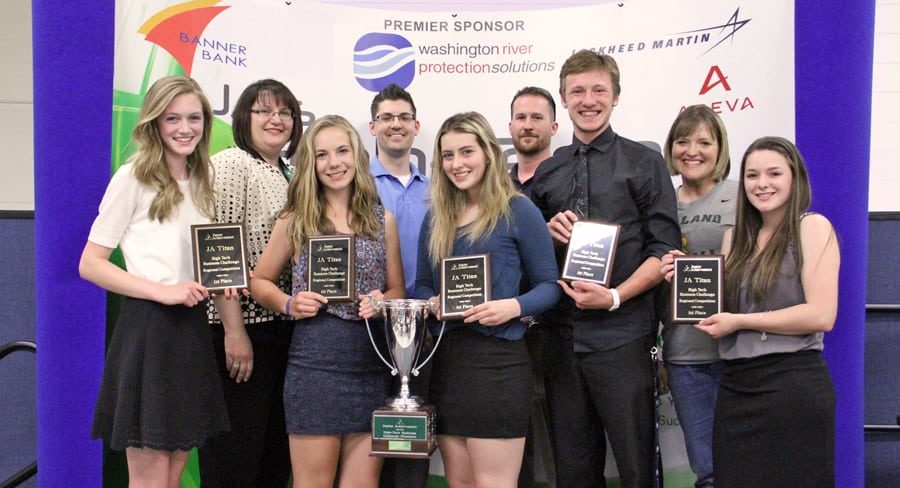
Home » Student executives make critical business decisions in Junior Achievement High Tech Business Challenge
Student executives make critical business decisions in Junior Achievement High Tech Business Challenge

May 13, 2016
Melinda Merrill is only 15, but she already knows exactly what to do when her company faces danger of bankruptcy due to an increasingly obsolete product offering. She cuts costs and controls marketing expenses.
These were decisions she and her team at Richland High School had to make as part of the Junior Achievement High-Tech Business Challenge. They were the winning team at the ninth annual business simulation competition, which places students in the CEO seat making high stakes decisions in product development, marketing, hiring, and price setting.
The competition is based on JA’s Titan program, which is taught in the high schools by local community and business volunteers. Top students from the competing teams in schools that had JA Titan programs during the current school year are invited to attend. This year, nine high schools attended, with 16 teams competing.
“It really sparked my interest in business and business careers,” said Merrill. “You’re the CEO of your company and you have all these factors you have to play with to get a leg up on the competition — like how much do we invest in marketing and advertising our product? How much research do we put into improving our product?”
And there were some challenging moments, she said. The students are presented with various scenarios, like what waning demand for their product, that they must use to make business decisions.
“When we practiced in class how to address product obsolescence,” she said. “We went bankrupt three times, so we were nervous going into the competition. But our coach advised us and although we were nervous about taking any big risks at that point in the competition, we had to start doing everything opposite we had been doing. We were just trying to stay alive as a company, so we began cutting costs.”
The teams use an interactive online business simulation called JA Titan. Teams run their own companies, manufacturing and selling a fictional high-tech product, and compete for market share against other players. Success depends on how well they manage the company and how well they perform, based on the ability to manage six key business decisions: product price; production levels; marketing expenses; R&D costs; capital investment levels; and charitable giving.
More than technical aspects of running a business, students also develop valuable workplace skills like teamwork, problem solving and critical thinking that will be beneficial when they enter the workforce.
“Students will also learn how to answer to a board by receiving feedback from corporate assistants during each quarter played,” said Susan Fillafer, regional director for JA. “They also learn the value of working as a team for the better of the whole.”
The winning team will receive a $200 cash prize for each member. The winning school also receives the Titan Traveling Trophy to display for the year. In addition, one student will win a grand prize drawing for a set of Beats2 from Best Buy.
“Between the hands-on experience and competitive nature, students see the full scope of what goes into running a business,” said Fillafer. “Once they enter the workforce, they’ll have a better understanding of why managers make the decisions they do. They learn to take ownership of their decisions and understand the impact those decisions can have on the success or failure of their business.”
The students also get the opportunity to learn and receive feedback from local executives making those same business decisions every day.
“A new part to the event this year was the opportunity for our ‘pretend CEO’s’ to sit at a roundtable discussion with our community’s ‘real CEO’s’ and executives to discuss career paths, challenges, and insight to the real world of work,” said Merrill.
During the roundtable discussion students get the opportunity to ask questions about possible careers paths in business and the qualifications, skills, and education needed to get there.
This roundtable panelists included: Bill Johnson, president, Mission Support Alliance; John Ciucci, president, CH2M Hill; Khris Beyer, owner, Real Centric Solutions; Amy Basche, manager, Washington River Protection Solutions; Ryan Burdo, Lockheed Manager; and Michael Scrimsher, manager, AREVA.
For Merrill that proved not only valuable in the challenge, but also offered a deeper glimpse into business careers.
“This game definitely did peak my interest in the business world, it was fun to be in charge,” she said. “I really enjoyed getting the opportunity to talk to actual CEOs and see where they came from, what they do, and how they got to where they are.”
Founded in 1919, Junior Achievement is a nonprofit economic education organization whose mission is to educate students in financial literacy, business and workplace skills, and entrepreneurship. This year’s main event sponsor was Washington River Protection Solutions.
“The JA Titan program and the High-Tech Business Challenge are great ways to engage and educate students in the realities of today’s business environment and help prepare them to be successful in careers and as informed citizens,” said Nathan Morgan, Washington River Protection Solutions, project controls manager and event chairman. “WRPS is pleased to support such an event. The students, as well as our community benefit from this spirited regional competition.”
For more information on Junior Achievement visit juniorachievement.org/web/ja-washingtonse.
Local News
KEYWORDS may 2016




